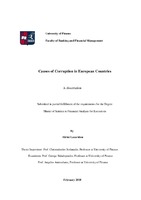Causes of corruption in European Countries

Master Thesis
Author
Λαζαρίδου, Ειρήνη
Lazaridou, Eirini
Date
2018-02Advisor
Στεφανάδης, ΧριστόδουλοςView/
Keywords
Corruption ; Economic growth ; Legal origin ; Religion status ; Institutions ; Education ; Culture ; Corruption Perceptions Index ; GDP per capitaAbstract
This paper examines the political, economic and social issues of corruption in modern society, whereas the implications of this multifaceted phenomenon are being demonstrated. Further on, the determinants that have been attributed as causes of this persistent problem are being presented in order to structure a full resolution framework. Deepening the analysis, an empirical research is being conducted via two separate cross-sectional regressions in an attempt to explore whether corruption as measured by the Corruption Perceptions Index could be predicted by a series of indicators, id est economic growth (estimated in GDP per capita), legal origin, religion status and Eurozone membership across the countries members of the European Union.
During the implementation process, the methodology adopted for both regressions is Ordinary Least Squares (OLS), while the conclusions of the tests reveal that the coefficient for GDP per capita is positive, implying that an increase in the level of economic development results in higher levels of the Corruption Perceptions Index and lower levels of corruption respectively, corroborating at the same time the theories perfectly. Moreover, the religion status, in fact the level of Protestants, appears to have a positive impact on the efficiency of anti-corruption policy, illustrating the case that cultural and religious aspects bear equally high significance along with the economic variables.


